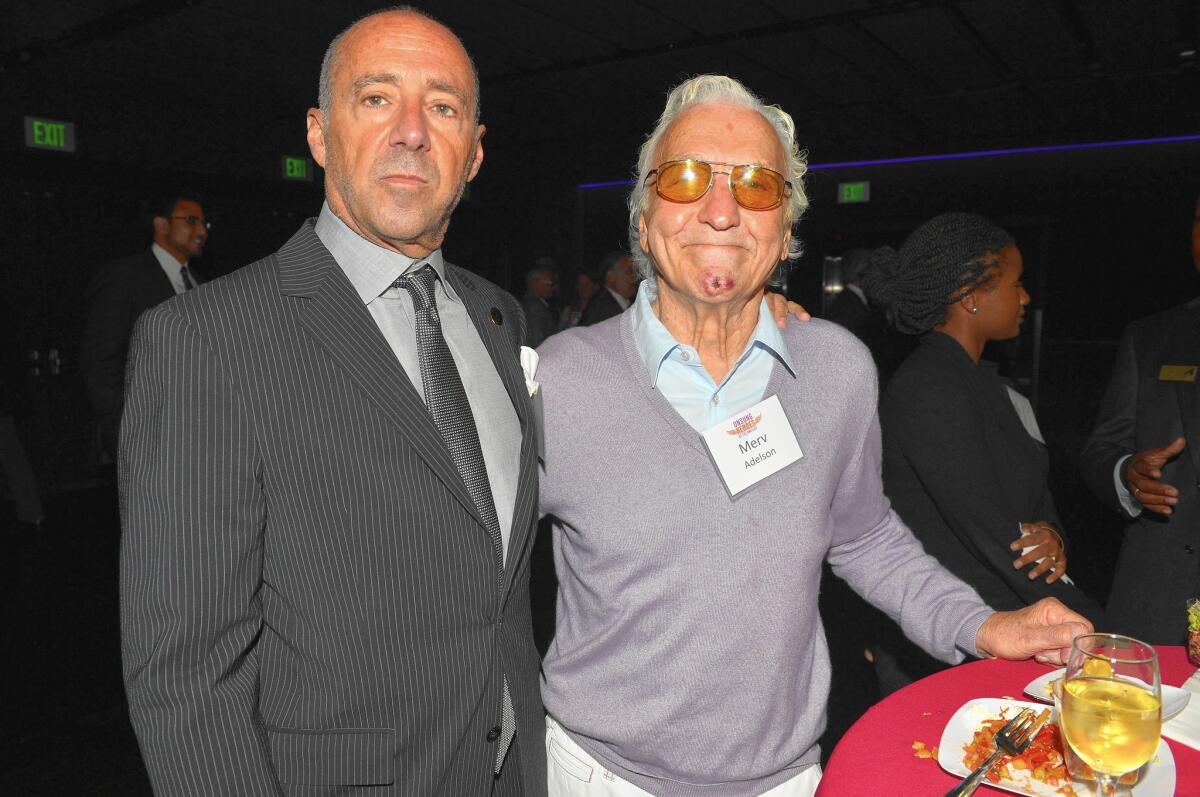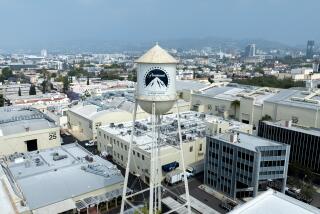Merv Adelson dies at 85; TV mogul and philanthropist

- Share via
Merv Adelson, a developer, philanthropist and onetime Hollywood mogul who churned out such top-rated TV shows as “The Waltons” and “Dallas” before losing his fortune in a series of financial disasters, has died at a medical facility in Canoga Park. He was 85.
The cause of his death Tuesday was complications of a stroke, said his son, Andrew.
Adelson found early success in the grocery business, building Las Vegas’ first 24-hour supermarket in the early 1950s. He later helped build the La Costa resort in Carlsbad, Calif., which quickly became a favorite with Mafia bosses and top celebrities, including Bing Crosby, Frank Sinatra and Dean Martin.
In 1969, after meeting producer Lee Rich, he formed Lorimar Productions, which launched the prime-time soap opera with such long-running hits as “Dallas,” “Falcon Crest,” and “Knots Landing.” He later was married to one of TV’s biggest stars, Barbara Walters.
He had an estimated worth of $300 million and homes in Bel Air, Malibu and Aspen, Colo., when a series of events, including the failure of a number of Internet start-ups he backed in the 1990s, led to ruin.
“His life was like a movie script you wouldn’t even believe — rags to riches to rags,” Irwin Molasky, his friend and former business partner, said Thursday.
Merv Lee Adelson was born in Los Angeles on Oct. 23, 1929. His parents, Nathan and Pearl, ran a few grocery stores, where Merv worked after school. As a teenager, he made deliveries to customers in Beverly Hills, meeting Cornel Wilde and other stars. By 21 he was managing one of the family stores.
He occasionally accompanied his father to Las Vegas, where a relative ran a casino. On one trip, “I suddenly thought, everything is open 24 hours, but there’s no place to buy groceries,” Adelson recalled in a 2013 Vanity Fair profile. “I got the idea: a 24-hour supermarket.”
With financing from his father and other investors, he opened Market Town off the Vegas Strip in 1953. It was an instant success, and two more stores followed. He told Vanity Fair that he was a millionaire after the first year of business.
With Vegas booming, he teamed up with Molasky and started building houses around the Desert Inn golf course and hundreds more around the city. Later they built the Las Vegas Country Club and other projects, including the city’s first indoor mall and private hospital.
The latter was partly financed by gaming kingpin Moe Dalitz, who operated the Stardust and Desert Inn. Through Dalitz, Adelson got to know Sinatra, Martin, Don Rickles and other stars and was living a fast, colorful life.
But the fun stopped for Adelson when “The Green Felt Jungle,” a bestselling expose of crime and corruption in Las Vegas, was published in 1963. He was horrified to learn that it described Dalitz as a mob boss and Adelson as one of his front men. By then married and the father of three, Adelson felt disgraced and moved back to Southern California.
He could not, however, break the Mafia ties. When he and Molasky began to develop La Costa, Dalitz helped them secure a loan from the Teamsters’ pension fund. According to Vanity Fair, among the first guests when the resort opened in 1965 were Teamster officials and Mafia heavyweights, including Meyer Lansky.
Adelson told Vanity Fair he was unaware at the time of the union’s ties with the crime syndicate. And even though he regarded Dalitz as a mentor and close friend, he said he had no knowledge of the casino owner’s underworld dealings.
“All I can say is, in all the years I knew Moe, we never discussed anything criminal or illegal,” he told the magazine. “There was a line I never wanted to cross, and I didn’t.”
Although he later sold his interests in La Costa, he was dogged by rumors of his Mafia ties for years. He and Molasky sued Penthouse magazine in 1975 for an article that characterized the resort as a mob hangout and questioned the legality of the pension fund loan. They lost the lawsuit but later received an apology from the magazine.
By then Adelson was a power in Hollywood. With Rich, he turned Lorimar into a prime-time hit factory, starting with “The Waltons,” the CBS family drama set in the Depression-era South that drew such a devoted audience after its 1972 debut that it forced its main competition, NBC’s “The Flip Wilson Show,” off the air.
The company’s next success was “Eight Is Enough,” which was soon followed by “Dallas,” “Knots Landing” and “Falcon Crest.”
Besides spawning top-rated shows, Lorimar was a training ground for some of television’s major players, including CBS President and Chief Executive Leslie Moonves, who told Vanity Fair that Adelson was “a terrific boss” who started “a great television company … one of the most respected Hollywood will ever see.”
In the 1980s, Lorimar ventured into movies, scoring some critical and commercial hits, including “An Officer and a Gentleman” and “Being There.” But it also had a number of flops, including “Urgh” and “The Fish That Saved Pittsburgh.” Rich, the operation’s creative force, left Lorimar after a merger in 1986 with Telepictures Corp.
A few years later Adelson sold Lorimar for more than $1 billion to the entity that soon became Time-Warner. When the media giant’s stock tanked, Adelson lost millions. His investments in several Internet companies evaporated in the dot-com collapse of the late 1990s.
He once said Lorimar’s name was a mash-up of Palomar Airport in Carlsbad, where Adelson used to fly planes, and the first name of his then-wife, Lori.
He was married and divorced four times. His third marriage was to Walters, whom he met on a blind date in 1985 and married a year later. They were divorced in 1992.
In his last years, Adelson lived modestly. One of his residences was an apartment in Santa Monica described in the Vanity Fair profile as the size of walk-in closets at the far grander homes Adelson once owned.
Before the money ran out, he built a hospice at the University of Nevada-Las Vegas campus and named it for his father, who died a slow, painful death from cancer in 1978. Adelson also would struggle with cancer later.
“He wanted to provide death with dignity,” Molasky said of his former partner. “His father didn’t have it. And the shame of it is, the son didn’t either.”
Adelson is survived by three children from his first marriage, Ellen Ross, Andrew and Gary; two children from his fourth marriage, Lexi and Ava Nesis; and five grandchildren.
Twitter: @ewooLATimes
More to Read
Start your day right
Sign up for Essential California for the L.A. Times biggest news, features and recommendations in your inbox six days a week.
You may occasionally receive promotional content from the Los Angeles Times.







